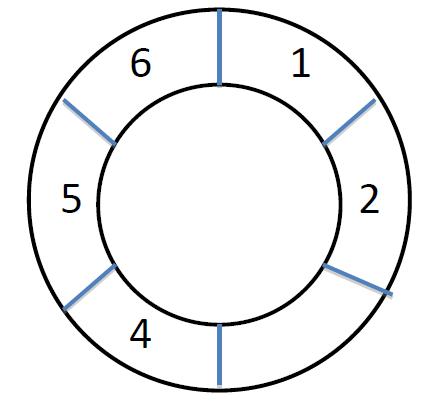HDU 4576 Robot(概率dp)
Robot
Time Limit: 8000/4000 MS (Java/Others) Memory Limit: 102400/102400 K (Java/Others)
Total Submission(s): 5906 Accepted Submission(s): 1754
Problem Description
Michael has a telecontrol robot. One day he put the robot on a loop with n cells. The cells are numbered from 1 to n clockwise.

At first the robot is in cell 1. Then Michael uses a remote control to send m commands to the robot. A command will make the robot walk some distance. Unfortunately the direction part on the remote control is broken, so for every command the robot will chose a direction(clockwise or anticlockwise) randomly with equal possibility, and then walk w cells forward.
Michael wants to know the possibility of the robot stopping in the cell that cell number >= l and <= r after m commands.

At first the robot is in cell 1. Then Michael uses a remote control to send m commands to the robot. A command will make the robot walk some distance. Unfortunately the direction part on the remote control is broken, so for every command the robot will chose a direction(clockwise or anticlockwise) randomly with equal possibility, and then walk w cells forward.
Michael wants to know the possibility of the robot stopping in the cell that cell number >= l and <= r after m commands.
Input
There are multiple test cases.
Each test case contains several lines.
The first line contains four integers: above mentioned n(1≤n≤200) ,m(0≤m≤1,000,000),l,r(1≤l≤r≤n).
Then m lines follow, each representing a command. A command is a integer w(1≤w≤100) representing the cell length the robot will walk for this command.
The input end with n=0,m=0,l=0,r=0. You should not process this test case.
Each test case contains several lines.
The first line contains four integers: above mentioned n(1≤n≤200) ,m(0≤m≤1,000,000),l,r(1≤l≤r≤n).
Then m lines follow, each representing a command. A command is a integer w(1≤w≤100) representing the cell length the robot will walk for this command.
The input end with n=0,m=0,l=0,r=0. You should not process this test case.
Output
For each test case in the input, you should output a line with the expected possibility. Output should be round to 4 digits after decimal points.
Sample Input
3 1 1 2
1
5 2 4 4
1
2
0 0 0 0
Sample Output
0.5000
0.2500
分析
code
1 #include<cstdio> 2 #include<algorithm> 3 #include<cstring> 4 5 using namespace std; 6 7 double f[2][210]; 8 // f[i][j]到第i次操作,位置j上的概率 9 10 int main() { 11 12 int n,m,l,r; 13 while (~scanf("%d%d%d%d",&n,&m,&l,&r) && n+m+l+r) { 14 memset(f,0,sizeof(f)); 15 f[0][1] = 1.0; 16 int cur = 0; 17 for (int w,i=1; i<=m; ++i) { 18 scanf("%d",&w); 19 w = w%n; 20 cur = cur^1; 21 for (int k=1; k<=n; ++k) { 22 f[cur][k] = f[cur^1][k+w>n?k+w-n:k+w]/2.0 + f[cur^1][k-w<1?k-w+n:k-w]/2.0; 23 } 24 } 25 double ans = 0.0; 26 for (int i=l; i<=r; ++i) ans += f[cur][i]; 27 printf("%.4lf\n",ans); 28 } 29 return 0; 30 }

